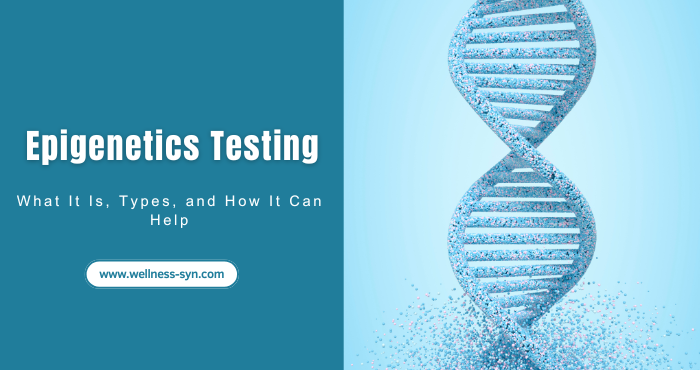Epigenetics Testing: What It Is, Types, and How It Can Help
Epigenetics testing is becoming more popular because it gives us new insights into how our lifestyle and environment affect our genes. This type of testing helps us understand how things like diet, stress, and toxins can switch our genes on or off, affecting our health in ways we didn’t know before. In this article, we’ll talk about epigenetics testing, the different types of testing, and how it can improve our health. If you’re curious about how your lifestyle might affect your genes, this article is for you!
What is Epigenetics?
Epigenetics studies how gene activity is regulated without changing the underlying DNA sequence. It focuses on how external factors, like diet, stress, toxins, and lifestyle, can influence whether specific genes are turned on or off. These changes can affect gene expression and impact various bodily functions, but unlike genetic mutations, they don’t alter the DNA code. Epigenetics scan helps explain how environmental and behavioral factors can shape our health, potentially influencing disease risk, aging, and overall wellness holistic health. In short, epigenetics is about how our environment and experiences can “switch” genes on or off.
What is Epigenetics Testing?
Epigenetics testing is a type of genetic test that looks at changes in gene activity. Instead of just looking at the genetic code, it studies changes in how genes are expressed, which can affect how your body works. Epigenetics testing aims to find markers in your DNA that have changed because of things like your lifestyle or environment. These changes can show how your habits, behaviors, and surroundings have affected your health. In some cases, they might even predict if you’re at risk for certain diseases in the future. Though epigenetics testing is still a new field, it has much potential, especially in understanding diseases like cancer, heart disease, and mental health problems.
Types of Epigenetics Testing
There are several types of epigenetics testing, each looking at how environmental factors affect gene activity. Here are some common types:
1. DNA Methylation Testing
One standard test is DNA methylation testing, which looks at changes to the DNA molecule itself. DNA methylation is when a small molecule is added to the DNA, which can turn off a gene, preventing it from being expressed.
This can change over time based on diet, exercise, and stress. Scientists can learn more about health risks and how lifestyle factors might affect genes by studying these changes.
2. Histone Modification Testing
Histones are proteins that help DNA stay compact. These proteins can also be changed in ways that affect gene activity. Histone modification testing looks at these changes, impacting whether a gene is turned on or off. These changes can be linked to diseases like cancer and neurological disorders. Scientists can see how lifestyle factors might affect gene activity and health by studying histone modifications.
3. Non-Coding RNA Testing
Non-coding RNAs are molecules that don’t make proteins but still play an essential role in regulating gene activity. Non-coding RNA testing looks at these molecules in your body. Changes in these molecules can be linked to conditions like cancer and heart disease. By studying non-coding RNAs, epigenetics testing can show how your environment and lifestyle affect gene activity.
4. Telomere Length Testing
Telomeres are the protective caps on the ends of chromosomes, and they get shorter as we age. Shorter telomeres are linked to aging and a higher risk of age-related diseases. Telomere length testing looks at how long your telomeres are, giving insight into your biological age and health. Since telomeres shorten because of things like stress and diet, this test can help show how your environment affects your health at the cellular level.
How Epigenetics Testing is Used
Epigenetics testing can be used in many ways, from helping doctors detect diseases early to creating personalized health plans. Here’s how it’s being used:
1. Early Disease Detection
Epigenetics testing can help detect early signs of diseases like cancer, heart disease, and neurodegenerative disorders. By identifying changes in gene activity, scientists may be able to spot people at higher risk before symptoms appear.
For example, specific DNA methylation changes are linked to cancer, and detecting them early could allow for better treatment and prevention.
2. Personalized Health Plans
Because epigenetics testing examines how lifestyle affects gene activity, it can help create personalized health plans. If a test shows that things like diet or stress negatively affect your genes, you can make changes to improve your health.
This might involve eating better, exercising more, or reducing stress. Epigenetics testing helps make these decisions more specific to you and your genetic makeup.
3. Understanding the Impact of Lifestyle Choices
Epigenetics testing can help you see how your lifestyle is affecting your genes. For example, if you’re worried about the impact of smoking, alcohol, or a poor diet, epigenetics testing can show how these habits might be changing your body on a molecular level.
This information can help you make better decisions to protect your health.
4. Aging and Longevity
Telomere length testing is one-way epigenetics testing can help with aging. Since telomeres shorten over time, this test can show how fast or slow your cells are aging. By understanding how your genes are aging, you can make lifestyle changes to slow aging and improve your long-term health.
Conclusion
Epigenetics testing is a powerful tool that helps us understand how our environment, lifestyle, and behaviors affect our genes. With different types of tests available, such as DNA methylation, histone modification, non-coding RNA, and telomere length testing, we can learn how genes are expressed and how lifestyle choices impact health. Epigenetics testing can improve disease prevention, create personalized health plans, and help us make better lifestyle choices. As science progresses, epigenetics may play an even more significant role in helping us stay healthy and make informed decisions about our well-being. To learn more about epigenetics testing and how it can help you, visit Wellness Synergy.
Disclaimer:
Wellness Synergy, its products, and Dr. Ilka Tamar do not intend to cure, treat, heal, or prevent diseases or illnesses. These statements have not been evaluated by the Food and Drug Administration. The information on our social media and website is for informational purposes only and is not a substitute for medical advice or diagnosis from your physician or other healthcare professional. This information is meant for general wellness purposes and does not claim to diagnose, treat, or cure any illness or health condition. If you suspect you have a medical issue, please contact your physician or healthcare provider.
Frequently Asked Questions (FAQ) About Epigenetics Testing
What is Epigenetics Testing?
Epigenetics testing examines how environmental factors, like diet, stress, and toxins, influence the expression of your genes without altering the underlying DNA seque
How does Epigenetics Testing differ from genetic testing?
Unlike traditional genetic testing that analyzes your DNA code, epigenetics testing focuses on changes in how your genes are expressed due to external factors. It looks at markers like DNA methylation, histone modifications, and telomere length.
What are the types of Epigenetics Testing?
DNA Methylation Testing: Examines changes in gene expression through DNA methylation.
Histone Modification Testing: Studies how changes in histone proteins affect gene activity.
Non-Coding RNA Testing: Focuses on molecules that regulate gene expression.
Telomere Length Testing: Measures the length of telomeres, which can indicate biological aging.
How can Epigenetics Testing help me?
It can help detect early signs of diseases such as cancer and heart disease, create personalized health plans, and reveal how lifestyle choices impact your genes and overall health.
What can I learn from Epigenetics Testing?
You can gain insights into your genetic health risks, how your lifestyle affects your genes, and make informed decisions about your health and wellness.
Is Epigenetics Testing suitable for everyone?
Epigenetics testing can benefit anyone looking to understand how their environment and behaviors affect their health, particularly those interested in disease prevention or improving long-term wellness.
How accurate is Epigenetics Testing?
While still a growing field, epigenetics testing is becoming increasingly reliable for providing insights into gene expression and health risks. However, results should always be interpreted in consultation with healthcare professionals.


